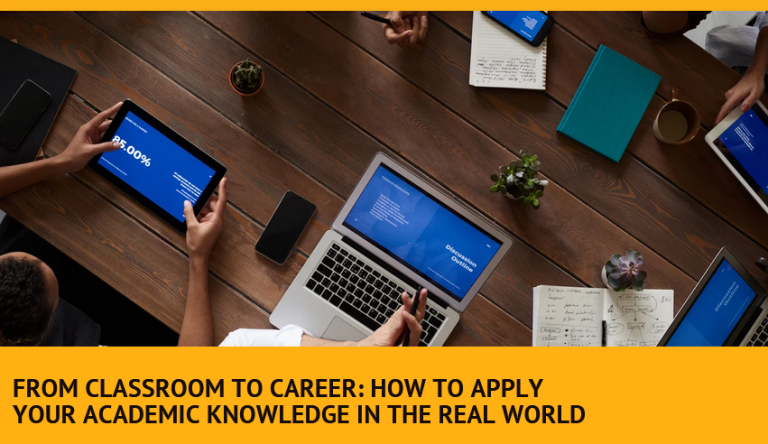Transitioning from the classroom to the professional world can be a daunting experience for many students. The journey from academic learning to a successful career involves more than just knowledge—it’s about applying that knowledge in practical, real-world settings. Here’s a guide on how students can translate their academic knowledge into valuable skills and experiences that will set them apart in the job market.
1. Engage in Internships
Internships are one of the most effective ways to gain practical experience. These opportunities allow students to work in their field of study, providing a bridge between theoretical knowledge and practical application. By participating in internship programs, students gain real-world experience, expand their professional network, and enhance their resumes. These benefits make students more attractive to potential employers and better prepared for their future careers.
2. Participate in Collaborative Projects
Collaborative projects offer students a chance to work on real-world problems alongside industry professionals. These projects help students develop critical thinking and problem-solving skills. By engaging in collaborative projects, students gain exposure to industry practices, valuable teamwork experience, and essential project management skills. This hands-on involvement not only enhances their practical knowledge but also prepares them for the complexities of the professional world.
3. Join Student Organizations and Professional Associations
Involvement in student organizations and professional associations related to your field can provide practical experience and networking opportunities. These organizations often host workshops, seminars, and networking events. By participating, students gain leadership experience, industry insights, and valuable professional connections. This engagement helps students develop essential skills and build a robust professional network, which can significantly benefit their career prospects.
4. Leverage Academic Projects and Research
Academic projects and research can be tailored to address real-world problems. By focusing on practical applications of your studies, you can gain relevant experience and contribute to your field. This approach deepens your understanding of your field, enhances your research skills, and can lead to potential publication opportunities, all of which are valuable for your career.
5. Seek Mentorship and Guidance
Finding a mentor in your field can provide valuable insights and advice on how to apply your academic knowledge in the professional world. Mentors can help you navigate your career path and offer support and encouragement. This personalized advice fosters professional development and provides essential career guidance.
6. Develop a Portfolio
A well-curated portfolio that showcases your academic projects, research, and practical experiences can be a powerful tool in the job market. Include case studies, project summaries, and any relevant work that demonstrates your skills and knowledge. A strong portfolio provides a visual representation of your abilities, enhances job applications, and serves as a professional showcase.
7. Take Online Courses and Certifications
Online courses and certifications can help you gain additional skills and knowledge that are in demand in the job market. These courses can complement your academic studies and provide practical skills. By enhancing your skillset, you foster professional development and improve your employability.
8. Network Actively
Networking is crucial in translating academic knowledge into career opportunities. Attend industry conferences, career fairs, and networking events to meet professionals and learn about job opportunities. Active networking leads to job leads, professional connections, and industry insights, all of which are essential for career growth.
9. Reflect and Adapt
Regularly reflecting on your experiences and adapting your approach is key to successfully applying academic knowledge in the real world. Identify areas where you can improve and seek feedback from peers and mentors. This process of continuous improvement fosters adaptability and personal growth, helping you stay relevant in your field.
How Qollabb Can Help
Qollabb plays a pivotal role in helping students bridge the gap between academic learning and the professional world. Here’s how Qollabb supports students:
1. Internships
Qollabb connects students with a wide range of internship opportunities across various industries, ensuring that they find positions that align closely with their career goals and academic background.
2. Collaborative Projects
Qollabb provides a platform where students can engage in meaningful projects with companies, giving them the opportunity to apply their academic knowledge in innovative ways.
3. Student Organizations and Professional Associations
Qollabb helps students discover relevant organizations and associations, and facilitates connections with professionals in their field through its network and events.
4. Academic Projects and Research
Qollabb can match students with industry projects that align with their academic interests, providing a platform to showcase their research and its practical implications.
5. Mentorship and Guidance
Qollabb connects students with experienced mentors from various industries, offering guidance and support to help them achieve their career goals.
6. Portfolio Development
Qollabb provides tools for students to create and share their portfolios with potential employers, highlighting their achievements and practical skills.
7. Online Courses and Certifications
Qollabb offers access to a variety of online courses and certifications, helping students enhance their skill sets and stay competitive in the job market.
8. Networking Opportunities
Qollabb organizes networking events and provides a platform for students to connect with industry professionals, fostering valuable relationships that can lead to job opportunities.
9. Reflection and Feedback
Qollabb offers feedback mechanisms and resources to help students reflect on their experiences and continuously improve their skills and approaches.
Conclusion
The transition from classroom to career involves actively applying academic knowledge in practical settings. By engaging in internships, participating in collaborative projects, joining professional organizations, and seeking mentorship, students can develop the skills and experiences that are valuable in the job market. Leveraging academic projects, developing a portfolio, taking online courses, and actively networking can further enhance employability.
Qollabb plays a crucial role in this journey by providing a platform that connects students with internships, collaborative projects, mentors, and professional networks. Embrace these strategies and leverage Qollabb to bridge the gap between academic learning and a successful career. By following these steps, students can confidently navigate the path from education to employment, ensuring that their academic achievements translate into real-world success.





